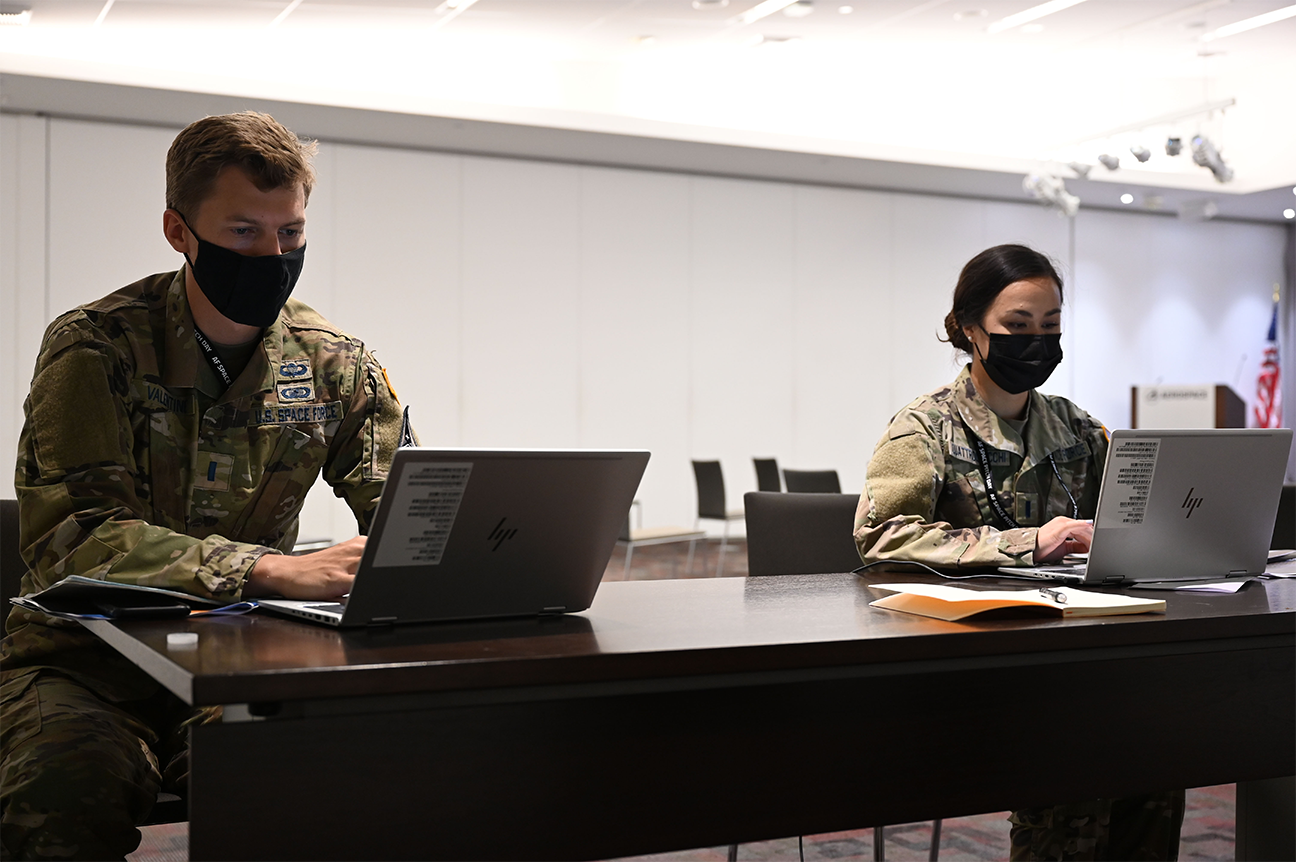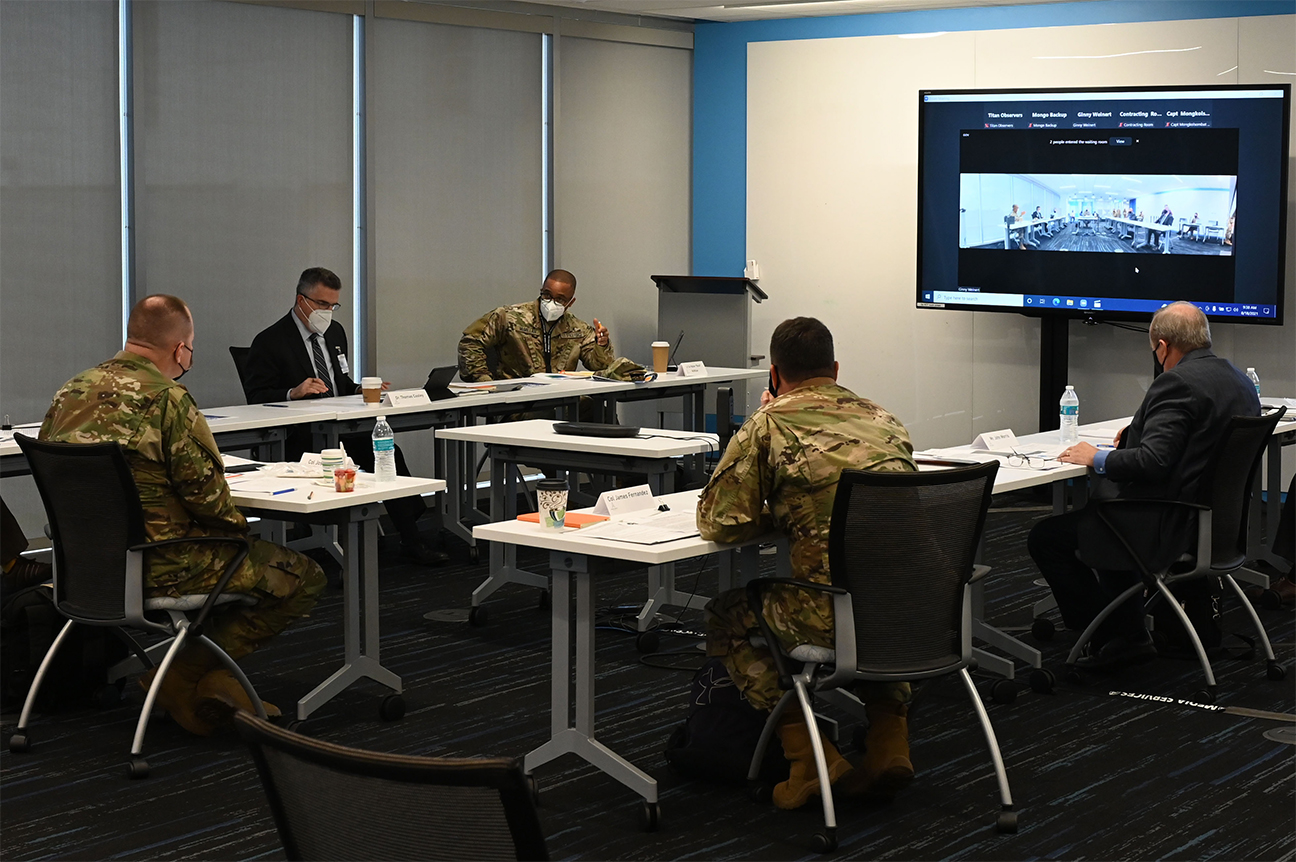SpaceWERX ready to propel space innovation
LOS ANGELES AIR FORCE BASE, Calif. (AFRL) – SpaceWERX officially lifted off Aug. 19 during the virtual Space Force Pitch Day. The event closed with 19 small businesses securing Phase II Small Business Innovation Research contracts to advance their cutting-edge space technologies.
The newly launched SpaceWERX will play a vital role in pursuing innovative technologies for the U.S. Space Force. It will operate as part of AFWERX, the Department of the Air Force’s innovation arm.
“What better way of introducing the new organization than bringing in new partners, locking in new investments and going after great space technology,” said Lt. Col. Walter “Rock” McMillan, SpaceWERX Director. “We’re excited to be partnering with these great companies and the great technology they bring to the table.”
The new innovation arm will create platforms for space operators, lab engineers, and acquisition professionals to collaborate with the brightest minds in academia and industry pursuing novel solutions. Moreover, it will continue to leverage proven AFWERX tools such as the SBIR Open Topic, Challenge platform, STRATFI initiative, and Prime program.
“SpaceWERX is going to be one of the key arms for innovation, driving culture change and capability development into our Department of the Air Force to ensure our Space Force has an enduring competitive advantage,” said Col. Nate Diller, AFWERX director.
This fall, AFWERX will jumpstart key SpaceWERX initiatives by offering a Phase I Open Topic Small Business Technology Transfer solicitation focused on space technologies. This effort will team small businesses with university researchers focused on space to simultaneously build the workforce and develop cutting edge space technologies. Open Topics allow companies and researchers to propose technology solutions they believe would benefit the warfighter even if the USAF or USSF has not issued a specific SBIR/STTR topic seeking a solution. The 2020 AFWERX AFVentures report shows the notable returns on investment using this approach as well as the ability of this program to bring in over 1,000 new companies to work with the DAF.
High-tech companies vie for contracts
During the Aug. 19 event, nearly two dozen small firms pitched their space and satellite technologies to judges, in hopes of receiving a Phase II SBIR contract. Power cells and batteries for satellites, servicing vehicles for refueling satellites, and virtual reality medical simulation training for space missions were among the technologies pitched.
Of those, 19 companies each were awarded a $1.7 million Phase II SBIR contract to further develop their technologies. The participating businesses had previously won SBIR Phase I contracts.
Phase I SBIR contracts provide small businesses threshold funding values to develop concepts, test feasibility, and identify potential DAF customers. With Phase II agreements, companies with feasible concepts can receive additional funding for prototyping through research, development, test, and evaluation based on user needs. Phase II companies also can receive follow-on contracts as they develop their technology for military and commercial uses.
The pitch day winners included: Archaius, Astrobotic, Architecture Technology Corp., Caliola Engineering, Cambrian Works, CAMX Power, Capella Space, Cognitive Space, eBase Analytics, Kestrel Corp., Lunewave, Lux Semiconductors, Orbit Fab, Phase Four, Rocket Communications, SimX, Starfish Space, The Provenance Chain Network, and Toyon Research Corp.
McMillan said the pitch day competition was tough and he encouraged businesses that walked away without contracts to keep trying.
We cannot let our foot off the gas
Public-private partnerships are crucial to advancing space technology and defending America’s military interests in space, said Joy White, head of contractor activity for Space Force and executive director of its Space and Missile Systems Center. Organizations such as SpaceWERX and the Space Enterprise Consortium can help accomplish this, she said.
“We have to find ways for small businesses and startups to reap the rewards of their precious investment of time, dollars and effort to build solutions for the government,” she said. “Our role is to clear the path for those longer-term, sustainable contracts that these solutions can be plugged into.”
In 2019, participants in a space pitch day were awarded SBIR Phase II contracts. Some of those companies later secured multimillion dollar contracts through AFVentures’ Strategic Financing (STRATFI) program and eventually landed non-SBIR government contracts.
For example, Swarm Technologies, a satellite data startup, received a Phase II award through the space pitch day as well as follow-on awards. It eventually secured a $12 million Phase III contract with the Air Force and now is being acquired by SpaceX.
Working with global partners also is critical to outperforming adversaries and strategic competitors. A pitch day held by the U.S. and the United Kingdom resulted in the host countries finding solutions related to machine learning, artificial intelligence and blockchain technologies. “While space is a vacuum, space acquisition cannot be developed in a vacuum,” she said.
“I am so proud of all we’ve done to tap into our industrial base,” White said. “But we cannot let our foot off the gas. We have to continue to push to find new and innovative ways to accomplish our mission at the speed of relevance. Your future and U.S. supremacy are not guaranteed. More is absolutely needed.”

U.S. Space Force 1st Lieutenants John Valentine, left, and Nicole Quattrociocchi, both Portfolio Architect Mission Innovation officers, work on their computers during the first inaugural Space Force Pitch Day Aug. 18, 2021, at Los Angeles Air Force Base, California. This year, SFPD was entirely virtual and featured two days of innovative collaboration between the Air and Space Forces and space industry companies from within the innovation ecosystem. (U.S. Space Force photo/ Staff Sgt. Andrew Moore)

U.S. Space Force 1st Lieutenants John Valentine, left, and Nicole Quattrociocchi, both Portfolio Architect Mission Innovation officers, work on their computers during the first inaugural Space Force Pitch Day Aug. 18, 2021, at Los Angeles Air Force Base, California. This year, SFPD was entirely virtual and featured two days of innovative collaboration between the Air and Space Forces and space industry companies from within the innovation ecosystem. (U.S. Space Force photo/ Staff Sgt. Andrew Moore)
